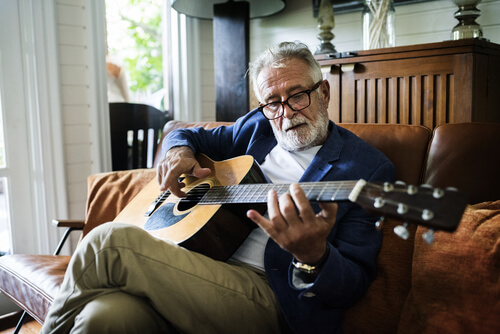
Music is a powerful tool for dealing with emotions and lifting spirits but it can also be a powerful tool for people living with dementia. Listening to and making music can be very beneficial to the brain, improving both brain function and mood. If you are living with dementia, incorporating music into your routine could provide great benefits to your health and happiness.
Neil Utley from The Utley Foundation, a charity that is campaigning to give every person in the UK with dementia access to music, says: “Music is not a ‘nice add-on’, it has tangible, evidence-based benefits and reaches out beyond the home to the care sector, hospitals, hospices and across the wider community.
“People with dementia often live in a silent world. Yet music can bring a person back to life. The ability to connect to music is an innate aspect of being human; having a diagnosis of dementia need not undermine this.”
What are the effects of music for people with dementia?
It’s no coincidence that you can remember the lyrics of songs sung in your childhood, even if you haven’t heard them for years and years, but not recall details about the last few days. Studies show that the brain remembers music far more effectively than any other information that we receive through our senses, particularly if it’s been sung.
Relieve stress and anxiety and improve mood
Music can have a soothing and uplifting effect. Many people with dementia also have depression, while the challenges of day to day life with dementia can be stressful. An American study at Temple University found that music can reduce stress and anxiety and even lower blood pressure.
Diana Kerr, author of Singing Groups for People with Dementia, says: “Singing makes us happy; even if the person with dementia forgets that they were singing soon after the event, this does not negate its worth as they still feel good even if they cannot remember why. People with dementia live much in the moment so we should be trying to make as many good moments as possible.”
Improve brain function
Regularly engaging in listening to, playing or singing music can actually help to protect against dementia and improve symptoms in those who already have it. Music is up there with a healthy lifestyle and learning languages as an effective tool for keeping the brain active. This kind of brain exercise builds more grey matter and neural pathways between cells, enabling different parts of the brain to communicate and so function more effectively. This can improve memory, language and ability to concentrate.
Bring back long-lost memories
Listening to songs that we enjoyed in a certain period of our lives can have a powerful effect on our memories. Hearing a song that you listened to often at one time can bring back not only memories but a sense of how you felt at that time in your life. Not only can this help mental clarity, but it can boost your sense of identity and self-confidence.
Aid in expressing their feelings
Many people with dementia have problems with their speech or trouble finding the right words to communicate how they feel. Music can help them express their emotions, whether that’s without words or by singing a song that reflects their mood.
Ted and Simon McDermott raised over £100,000 for the Alzheimer’s Society in 2016 when their video of them singing together in the care went viral. Ted used to be a redcoat and his son Simon encouraged him to keep singing when he was diagnosed with Alzheimer’s disease in 2013.
How to use music to help yourself or a loved one with dementia
Create a playlist
Music preference is very individual and the emotions we have when hearing certain songs is deeply personal. Creating a playlist (or even mix CD or tape) of you or your loved one’s favourite and most memorable songs can be a great tool if you are having a difficult day. Listening to your playlist while exercising, such as while out for a walk or even dancing, can be even more beneficial.
Playlist for Life has further advice on creating a dementia playlist and for inspiration they recommend BBC Music Memories, which has lists of songs specially chosen to aid with dementia and that are great to sing along to, from pub songs to television theme songs.
Remember that people with dementia can experience sound differently so always play music quietly at first.
Tune into m4d radio
Music for Dementia (m4d) is a group of five internet radio stations that launched in June 2020 and celebrated 30,000 listeners in its first month alone. You can select to listen to the day’s mix or choose music based on when you were born. The idea is that music that came out in your teens and twenties are some of the most memorable and beneficial to improving brain function and mood.
m4d radio is free and available 24 hours a day, all year round and you can listen here.
Attend a Singing for the Brain group
The Alzheimer’s Society runs group singing sessions for people with dementia and their carers. These are designed to be sociable as well as a brain-boosting activity. Its founder, Chreanne Montgomery-Smith, said she got the idea after seeing the effect of singing in a care home: “One lady who didn’t know her own name knew every song in the quiz and sang them all.
“It made me realise that people with dementia had a special ability to remember songs. Even if people with dementia can’t talk, they may be able to sing, whistle, clap or tap their feet. It helps them, and their carers to feel life is worthwhile.”
Usually these are face-to-face meetings but during the coronavirus pandemic this has not been possible, however you can still attend sessions online via Zoom or by phone.
Engage in music therapy
Professional music therapists use music as a means of connecting and communicating with clients. In the same way that other therapists get people to talk through their troubles, music therapists help people to express and work through their emotions using instruments or singing. You can seek individual sessions with a therapist or attend a group session. To see what’s available in your area, you can have a look at the British Association for Music Therapy’s interactive map.


